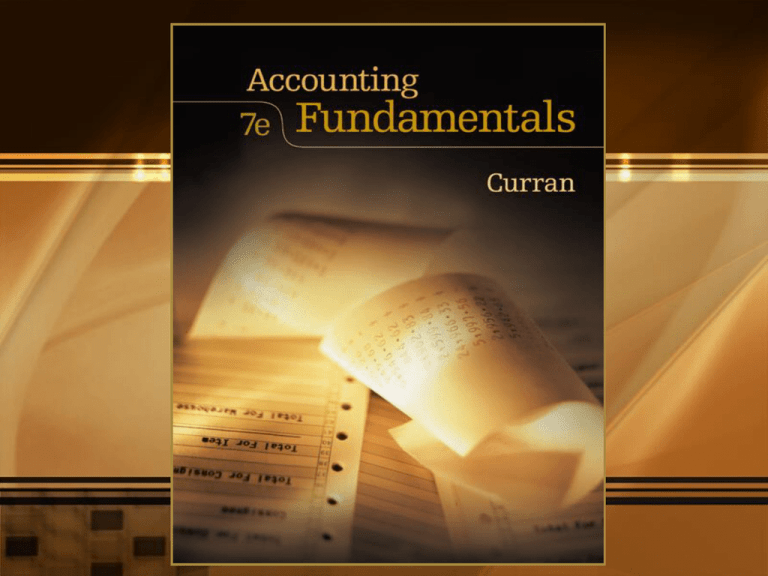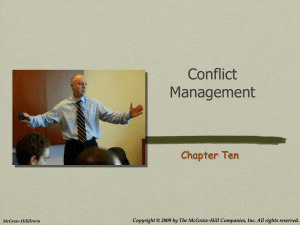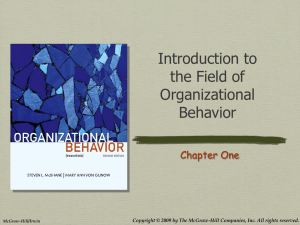
CHAPTER EIGHTEEN
THE CASH
PAYMENTS
JOURNAL
18-3
THE CASH PAYMENTS JOURNAL
Objectives:
1. Record transactions in a Cash
Payments journal.
2. Total, prove, and rule the Cash
Payments journal.
3. Post from the Cash Payments journal.
McGraw-Hill/Irwin
Accounting Fundamentals, 7/e
© 2006 The McGraw-Hill Companies, Inc., All Rights Reserved.
18-4
Setting Up a Cash Payments
Journal
This special journal is used to
record only payments of cash.
McGraw-Hill/Irwin
Accounting Fundamentals, 7/e
© 2006 The McGraw-Hill Companies, Inc., All Rights Reserved.
18-5
Setting Up a Cash Payments Journal
(continued)
The Cash Payments journal has five
money columns. All credits are
entered in the last two money
columns.
The purchases discount credit
column is used to record any
purchases discounts taken.
McGraw-Hill/Irwin
Accounting Fundamentals, 7/e
© 2006 The McGraw-Hill Companies, Inc., All Rights Reserved.
18-6
Setting Up a Cash Payments
Journal (continued)
The Cash Credit column is used to
record the amount of cash payment
in each transaction.
McGraw-Hill/Irwin
Accounting Fundamentals, 7/e
© 2006 The McGraw-Hill Companies, Inc., All Rights Reserved.
18-7
Setting Up a Cash Payments
Journal (continued)
The debit section of the Cash
Payments journal contains three
money columns.
The Accounts Payable Debit column
is used to record the amounts paid
to creditors on account.
McGraw-Hill/Irwin
Accounting Fundamentals, 7/e
© 2006 The McGraw-Hill Companies, Inc., All Rights Reserved.
18-8
Setting Up a Cash Payments
Journal (continued)
The Merchandise Purchases Debit
column is used to record the
amounts received from purchases.
McGraw-Hill/Irwin
Accounting Fundamentals, 7/e
© 2006 The McGraw-Hill Companies, Inc., All Rights Reserved.
18-9
Setting Up a Cash Payments
Journal (continued)
The last money column in the debits
section -- Other Accounts -- is used
to record the debit entries for cash
paid to sources other than cash
purchases and amounts paid to our
creditors.
McGraw-Hill/Irwin
Accounting Fundamentals, 7/e
© 2006 The McGraw-Hill Companies, Inc., All Rights Reserved.
18-10
Setting Up a Cash Payments
Journal (continued)
The two credit columns reflect
purchase discounts and cash
paid out.
McGraw-Hill/Irwin
Accounting Fundamentals, 7/e
© 2006 The McGraw-Hill Companies, Inc., All Rights Reserved.
18-11
Recording Transactions in the Cash
Payments Journal
For cash purchases, cash is credited
in the Cash credit column and
purchases are debited in the
Purchases Debit column. Purchase
discounts are recorded in the
Purchase Discount credit column.
McGraw-Hill/Irwin
Accounting Fundamentals, 7/e
© 2006 The McGraw-Hill Companies, Inc., All Rights Reserved.
18-12
Recording Transactions in the Cash
Payments Journal (continued)
When cash is paid for money owed a
creditor, and it is after the discount
period, Accounts Payable is debited
and cash is credited using both
special columns.
McGraw-Hill/Irwin
Accounting Fundamentals, 7/e
© 2006 The McGraw-Hill Companies, Inc., All Rights Reserved.
18-13
Recording Transactions in the Cash
Payments Journal (continued)
When cash is taken by the owner for
personal use, the Other Accounts
Credit column is used, writing in the
owner’s withdrawal account, and
cash is debited using the Cash credit
column.
McGraw-Hill/Irwin
Accounting Fundamentals, 7/e
© 2006 The McGraw-Hill Companies, Inc., All Rights Reserved.
18-14
Advantages to using the Cash
Payments Journal
All entries for the payment of cash
are grouped in one place.
Important facts about each
transaction are written on a single
line.
McGraw-Hill/Irwin
Accounting Fundamentals, 7/e
© 2006 The McGraw-Hill Companies, Inc., All Rights Reserved.
18-15
Advantages to using the Cash
Payments Journal (continued)
There is limited need to enter
account titles long explanations for
each transaction.
McGraw-Hill/Irwin
Accounting Fundamentals, 7/e
© 2006 The McGraw-Hill Companies, Inc., All Rights Reserved.
18-16
Advantages to using the Cash
Payments Journal (continued)
The Cash Payments journal allows
for the division of labor -- one
person can be put in charge of
entering Cash Payments.
However, more than one person
should be responsible to verify
cash transactions.
McGraw-Hill/Irwin
Accounting Fundamentals, 7/e
© 2006 The McGraw-Hill Companies, Inc., All Rights Reserved.
18-17
Posting From the Cash Payments
Journal
During the month, each amount
appearing in the Other Accounts
Debit column of the Cash Payments
journal is posted individually to the
account named in the entry.
McGraw-Hill/Irwin
Accounting Fundamentals, 7/e
© 2006 The McGraw-Hill Companies, Inc., All Rights Reserved.
18-18
Posting From the Cash Payments
Journal (continued)
After totaling the columns, the total
debits should equal the total credits.
Each column total is posted to the
appropriate account using the
acceptable post-referencing
notations.
McGraw-Hill/Irwin
Accounting Fundamentals, 7/e
© 2006 The McGraw-Hill Companies, Inc., All Rights Reserved.
18-19
Payment of Sales Tax
When collected taxes are sent to the
sales tax agency, the Sales Tax
Payable account is debited and the
Cash account is credited.
McGraw-Hill/Irwin
Accounting Fundamentals, 7/e
© 2006 The McGraw-Hill Companies, Inc., All Rights Reserved.
18-20
Accounting Terminology
•Cash payments journal
•Check stubs
•Checkbook
•Posting reference CP
McGraw-Hill/Irwin
Accounting Fundamentals, 7/e
© 2006 The McGraw-Hill Companies, Inc., All Rights Reserved.
18-21
Chapter Summary
• The Cash Payments journal is a
special journal in which all of
business’s Cash Payments
transactions can be recorded in
chronological order.
McGraw-Hill/Irwin
Accounting Fundamentals, 7/e
© 2006 The McGraw-Hill Companies, Inc., All Rights Reserved.
18-22
Chapter Summary (continued)
• The use of a Cash Payments journal
makes an accounting system more
efficient.
• The Cash Payments journal usually
has several special money columns
that simplify the recording of
routine entries.
McGraw-Hill/Irwin
Accounting Fundamentals, 7/e
© 2006 The McGraw-Hill Companies, Inc., All Rights Reserved.
18-23
Chapter Summary (continued)
• The source of information for
entries in the cash payments
journal is usually the checkbook of
a business.
• The totals of the debits and credits
must be equal for each transaction
recorded in the Cash Payments
journal.
McGraw-Hill/Irwin
Accounting Fundamentals, 7/e
© 2006 The McGraw-Hill Companies, Inc., All Rights Reserved.
18-24
Chapter Summary (continued)
• The debits in the Other Accounts column
are posted individually during the month to
the general ledger accounts indicated in
the journal entries.
• Column totals are posted at the end of the
month to the appropriate accounts.
McGraw-Hill/Irwin
Accounting Fundamentals, 7/e
© 2006 The McGraw-Hill Companies, Inc., All Rights Reserved.
18-25
Chapter Summary (continued)
• Cross-footing is the process of
checking the accuracy of column
totals.
• A retailer who is responsible for
collecting sales tax must send the
sales tax to the government at
regular intervals specified by the
government agency.
McGraw-Hill/Irwin
Accounting Fundamentals, 7/e
© 2006 The McGraw-Hill Companies, Inc., All Rights Reserved.
18-26
Chapter Summary (continued)
• Businesses can adapt the Cash
Payments journal form to meet their
needs.
• There is still a need for a general
journal to record transactions that
cannot be recorded in the special
journals.
McGraw-Hill/Irwin
Accounting Fundamentals, 7/e
© 2006 The McGraw-Hill Companies, Inc., All Rights Reserved.
18-27
Investigating on the Internet
As a research assignment, access the
Bluelight® web site and report the sources
of information that might concern Cash
Payments.
McGraw-Hill/Irwin
Accounting Fundamentals, 7/e
© 2006 The McGraw-Hill Companies, Inc., All Rights Reserved.
18-28
Topic Quiz
Answer the following true/false questions:
1. Grouping cash payments in one place is
a disadvantage for a company.
FALSE
2. A general journal must still be used to
record transactions that cannot be
entered into special journals
TRUE
3. There is one standard Cash Payments
journal form that must be used,
according to the IRS.
FALSE
McGraw-Hill/Irwin
Accounting Fundamentals, 7/e
© 2006 The McGraw-Hill Companies, Inc., All Rights Reserved.









